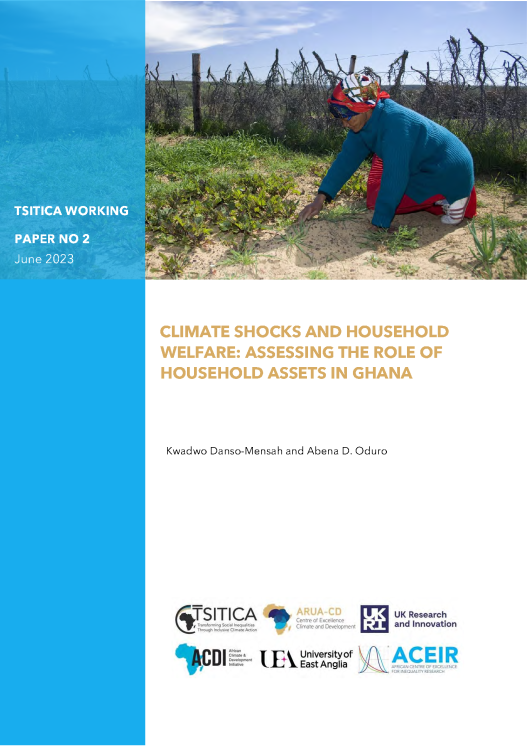Climate shocks and household welfare: Assessing the role of household assets in Ghana
Kwadwo Danso-Mensah, & Abena D. Oduro
TSITICA Working Paper no. 2, June 2023
Published by ARUA Centre of Excellence in Climate Change and Development & African Centre of Excellence for Inequality Research.

Household assets serve as coping mechanisms for households during periods of shocks such as those related to climate change. In this study, the authors explore the buffering capacity of different household assets in smoothing consumption during periods of climate shocks. They combined a three-wave dataset of household socio-economic characteristics spanning about eight years with a multi-scalar index which captures the duration and intensity of wetness or dryness at a particular location. Using random-effects models, the total value of household assets as well as their disaggregation into six classes of assets were analysed – the value of households’ ownership of livestock, agricultural equipment, non-agricultural land, financial assets, business assets and durable goods. The results show that severe flood events have a significant negative effect on households’ welfare, but the buffering effect of household assets depends on the duration of flood, type of asset and household location. For instance, some assets which may be described as productive assets such as livestock and agricultural tools tend to be maintained or protected throughout the duration of floods, but the effect of livestock matter for urban households whilst that of agricultural tools matter for rural households. Again, although non-agriculture land tends to be deployed after a much longer duration of floods, it serves as a buffer throughout the length of floods for rural households. These findings contribute to understanding the complex relationships between different assets and climate shocks, which are fundamental to enhancing the design and effectiveness of various asset accumulation interventions to mitigate the welfare effects of protracted crises. Read more
TSITICA was a collaborative, multi-country interdisciplinary research project. It brought together two ARUA Centres of Excellence with researchers from the universities of Ghana, Nairobi and Cape Town, and from the UK universities of Bristol, East Anglia and Manchester and the London School of Economics. The support of the African Research Universities Alliance (ARUA) and UK Research and Innovation (UKRI) are gratefully acknowledged. Visit project website.
